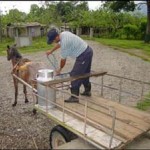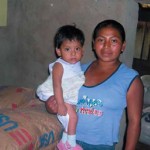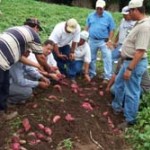
In 2000, only twenty percent of the raw milk produced in Honduras was being processed due to its poor quality resulting from inadequate on-farm milk sanitation and handling as well as a lack of cooling facilities. Farmers faced low productivity, reduced income, and severe price fluctuations as a result of this inferior milk quality.

Life is not easy for Iris Cálix. Her two-year-old daughter has a medical condition that requires treatment in the capital city of Tegucigalpa in Honduras once a month. This involves a long trip, most of it on dirt roads.

Jose Gomez, who successfully completed drug rehabilitation treatment at Proyecto Victoria, now works as a volunteer at the Center. Proyecto Victoria, a residential center for drug and alcohol abuse rehabilitation, is the only hope for many Hondurans addicted to drugs and alcohol.

With USAID support over a seven-year period, a new Criminal Procedure Code (CPC) became effective in early 2002. The CPC introduced changes to the criminal justice system in Honduras, including oral adversarial trials, transparent procedures, and greater protections for individual rights. Implementation of this new system required a series of efforts. Among the most important initiatives were changing the country’s perception of the criminal justice system and educating citizens and administrators of this new system.

Small farmers in Honduras have traditionally planted corn, beans and coffee, mostly for subsistence. Any surplus was sold on the local market, earning small profits. With the possible ratification of international trade agreements, Honduran small farmers need to become more competitive to remain viable and profitable in the global marketplace. And while sweet potatoes were traditionally grown in small volumes for the local market, farmers did not have international networks or the expertise to produce a high-quality crop.








Comment
Make a general inquiry or suggest an improvement.